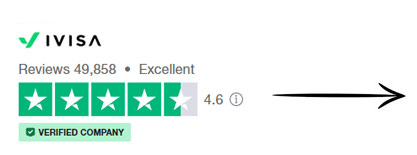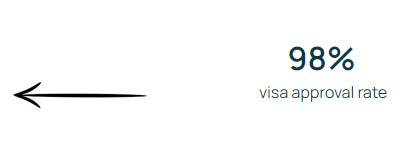Indian visa validity period
Find the answers to your questions about the validity and length of stay of your visa in India and its extension or renewal.
 Fast: Simplified, efficient process.
Fast: Simplified, efficient process.
 Security: information is protected.
Security: information is protected.
 Reliability: 98% approval rate.
Reliability: 98% approval rate.
 Assistance: 24/7 customer support.
Assistance: 24/7 customer support.


When planning a trip to India, it's essential to familiarise yourself with the country's entry and residence requirements. Among these conditions, the validity of the visa and the authorised length of stay are of vital importance. Understanding the validity of your visa for India and the authorised length of stay is crucial to avoiding any inconvenience during your trip. By complying with these rules, you can ensure that you remain compliant with Indian laws and avoid potential problems when you arrive in or leave the country. It is therefore essential that you understand the validity and length-of-stay details associated with your Indian visa. On this page, we will look in detail at the validity of the India visa, i.e. the period for which it is considered legally valid. We will also look at the authorised length of stay, i.e. how long you are allowed to stay in India on your visa. In addition, we will provide information on the procedure for extending or renewing your stay if necessary. Finally, we'll share practical tips on how to comply with Indian visa rules.
India visa validity: In brief
- Types of visa: The length of validity of your visa for India depends on the type of visa you are applying for. There are different types of visa for India, such as tourist visas, business visas, work visas and student visas.
- Validity of tourist visas: Indian tourist visas are generally valid for 6 months from the date of issue. They allow two entries into India. Tourist visas valid for one year and five years also exist, but are rarer and must be applied for separately.
- Validity of business visas: The validity of Indian business visas varies according to the length of stay and the number of entries required. Business visas can be valid for between 3 months and 1 year and allow multiple entries.
- Validity of work visas: Indian work visas are generally valid for between 1 and 5 years, depending on the type of employment contract. Work visas allow multiple entries.
- Validity of student visas : Indian student visas are generally valid for the duration of your studies, plus a further 6 months. Student visas allow multiple entries.


The validity of a visa for India refers to the period during which the visa is considered legally valid for entry into the country. It is important to note that the validity of the visa does not correspond to the authorised length of stay in India, but rather to the period during which you can use the visa to enter the country.
India offers different types of visa depending on the nature and purpose of your trip. Commonly requested visa types include tourist visas, business visas, student visas, as well as other specific visa types such as work visas, medical visas, etc.
It is important to stress that the validity of your visa does not automatically determine the length of your stay in India. The length of stay will be indicated on your visa or determined by the Indian rules and authorities on your arrival.
The duration of validity of an Indian visa can also vary according to nationality. For example, US citizens can obtain a tourist visa valid for 10 years with multiple entries, while for other nationalities, such as certain Asian or African countries, visas may be limited to a period of 6 months, or include restrictions on the number of entries authorized.
The authorised period of stay refers to the length of time you are allowed to stay in India on your visa. This period is determined by the specific rules associated with each type of visa and may differ depending on your reason for travel, such as tourism, business, study, etc.
If you wish to extend your stay in India beyond the initial period authorised by your visa, or if you need to renew your visa, it is important to be aware of the options available to you. The options for extension or renewal may vary depending on the type of visa you hold.
The procedure for extending or renewing your visa for India can be complex and often requires advance planning. Here are the general steps to follow:
If your visa for India has expired, you cannot enter India.
Here are your options:
1. Apply for a new visa
2. Leaving India
3. Applying for a visa extension
Find out if your question has been answered in the list below
The conditions for extending your stay in India depend on the type of visa you hold. Generally, you will need to submit an extension application to the Indian Immigration Office before your initial visa expires. You will need to provide evidence of your legitimate need to stay in India, such as medical, professional or personal reasons. It is advisable to check the specific rules applicable to your type of visa and to follow the established procedures.
As a general rule, it is not possible to renew a visa once it has expired. You will have to leave India and apply for a new visa from your country of origin or from a neighbouring country. It is important to respect the validity of your visa and not to overstay. If you need to stay longer in India, it is advisable to apply for an extension before your visa expires.
No, the authorised length of stay can vary depending on the type of visa. For example, tourist visas generally range from 30 days to 180 days, while business visas may allow longer stays depending on specific business needs. Student visas are often linked to the duration of the study programme, with an additional period for internships or post-study research. Each type of visa has its own rules and conditions concerning the authorised length of stay.